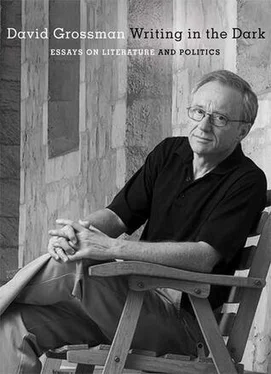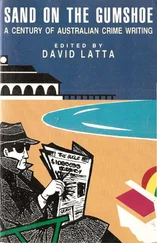First, I feel that the very ability and willingness to imagine a state of peace means, primarily, believing that we, the Israelis, have a future. I am not even speaking of a good future or a bad future at this point, but of the mere possibility of there being a future . Of a solid faith in the idea that Israel will exist for many years to come, a prospect that is by no means certain in the minds of many Israelis.
Perhaps the root of the almost unconscious affinity between “peace” and “future” in the Hebrew language lies in the fact that the short history of the State of Israel, and the much longer history of the Jewish people, comprises almost no prolonged periods of absolute peace, of being in a state of unthreatened tranquillity and security. And so, in Jewish and Israeli consciousness, the word “peace” is always deeply connected with a wish, a hope, not necessarily an existing, concrete state. The Hebrew word for “peace” ( shalom ) seems to be unique: it is a noun, but hiding within it, like a stowaway, is a verb that is always conjugated in the future tense.
The hope for peace is also a primary element in Jewish prayer and in the biblical prophecies of consolation. Only in the future, and in fact only at the end of days, “nation shall not lift up sword against nation, neither shall they learn war any more,” as prophesied by Isaiah. And only at the end of days, David promises Jerusalem, will “peace be within thy walls, and prosperity within thy palaces.”
“And I will rejoice in Jerusalem,” continues Isaiah, “and the voice of weeping shall be no more heard in her, nor the voice of crying. There shall be no more thence an infant of days, nor an old man, that hath not filled his days; for the youngest shall die a hundred years old.” (You can surely imagine how these words echo in the current Israeli reality, in which so many parents bury their children, “the youngest.”) There is hope and beauty in this affinity between “peace” and “the end of days,” yet because the end of days is usually perceived in Jewish-Israeli consciousness as an abstract, utopian, even unattainable point in time, peace too is seen as abstract, utopian, and unattainable: a horizon that grows ever more distant as one approaches it.
When we allow ourselves to seriously contemplate the hope that we will have peace, this inherently contains the possibility that we will have a future. A future as a people, a future as a state. This is no trivial matter. For most Israelis the possibility of a future cannot be taken for granted. I do not believe there are many other nations with such a skeptical view of the likelihood that they will indeed have a future, and continuity, and an ongoing existence in the place where they live. When we read in an American newspaper, for example, that the United States is planning its wheat crops for 2025, it sounds completely rational and natural. But what Israeli would dare to speak nonchalantly about the forecast milk production from cows in Israel twenty-one years from now? I myself can attest that when I think about Israel in such future-tense terms, I immediately feel a pang of guilt, as if I had violated some taboo — as if I had allowed myself too large a dose of future.
It is interesting to note that although the Jewish people is so ancient, with such continuity of historical consciousness and identity, it seems that a significant element in its self-definition is the sense of impending annihilation, of the calamity hovering over its head. This is the feeling to which every Jew gives voice at Passover, when he reads in the Haggadah: “That in every generation they rise up to destroy us.” This feeling did not, of course, arise out of paranoid delusions, but due to verified historical reasons. But the question that interests us today is whether life in a continued state of peace and existential security might ever alter this feeling, this bitter worldview so deeply ingrained in the Jewish soul, this self-perception that essentially dictates a conditional, fragile existence, a rare state of being among other nations.
Another question follows the previous one, grasping at its heels: What is it like to live without an enemy?
I imagine that to some, particularly those born after the Second World War, this may seem a peculiar query. But like any Israeli, I myself have never known a life without an enemy. I do not know what it means to live my life without the constant presence of an existential threat. Without the urge to fortify ourselves, to protect ourselves, and to act aggressively against those who threaten our homes and sometimes our lives.
I imagine that even if a peace agreement were reached soon, it would be — at least during the first years — fragile and extremely weak, and paved with acts of terror and violence on both sides. We will therefore not have to face the “problem” of living without an enemy anytime soon. But I hope that future generations will have to contend with it.
It will be a huge challenge: to learn to live a life that is not defined by hostility, anxiety, and violence. To foresee a continuum of existence and a constant future. To educate children based on views and beliefs that are not shaped inevitably by the fear of death. To raise our children not based on the daily fear that they may be taken from us at any moment. Perhaps then we may slowly discover that together with the forgoing of anxieties, we can begin to forgo certain elements of the Israeli ethos, a large part of which was forged through military conflict. We may forgo the perception of power as a value in and of itself, and the excessive admiration of power and its agents — the army and the military commanders — an admiration that results in the recurrent election of glorified militarists to lead the country, thereby sentencing it to act according to a narrow military frame of mind, and essentially within a never-ending war.
(In other words: It is highly rational for a nation always in a state of war to elect combatants as its leaders. But could it be possible that the fact that these combatants are the nation’s leaders decrees that the nation be in a constant state of war?)
Perhaps, if we know a life of peace, we may also let go of the obsessive need, shared by so many of us, for some artificial “unity,” which is viewed as sacred and is supposedly meant to strengthen our standing against anything that may undermine our stability as a society and as a people. Except that in a state of existential anxiety like the one we live in, even a new challenge , a new chance, a new hope, is often perceived as a threat to stability, even if that stability is a fairly dismal one; consider, for example, the panicked refusal with which Israel reacts to the repeated signals of peace coming recently from Syria.
The sense of besiegement and the fear of what is being plotted against us beyond the borders inevitably create an eagerness for internal consensus at any cost — a consensus that sometimes seems like the frightened convergence instinct of a threatened herd of cattle. But if the day comes when we do not have to define ourselves in terms of war and besiegement, if we allow ourselves to gradually let go of rigid, narrow-minded, and one-dimensional definitions of those who are “with us” and those who are “against us,” of those who are one of “us” and those who are foreigners (and as such, suspected as enemies), perhaps we will slowly learn to be more tolerant of diverse opinions and different voices in politics, art, gender roles, relations between men and women, and, not least, the tense and volatile relationship between Arabs and Jews within the State of Israel.
If we ever achieve a state in which we have no enemies, perhaps we will be able to break free from the all-too-familiar Israeli tendency to approach reality with the mind-set of a sworn survivor, who is practically programmed— condemned —to define the situations he encounters primarily in terms of threat, danger, and entrapment, or a daring rescue from all these. The survivor ignores anything that may complicate his worldview or delay his reactions, and so he tends to ignore the gray areas, the nuances, without truly facing the complex and contradictory nature of reality, with all the chances and promises it offers. He thereby all but dooms himself to exist forever within this partial, distorted, suspicious, and frightened picture of reality, and is therefore tragically fated to make his anxieties and nightmares come true time and time again.
Читать дальше












